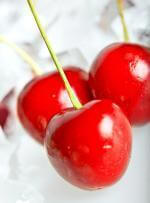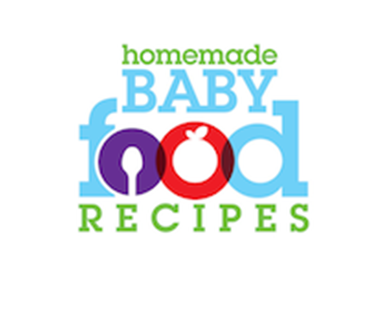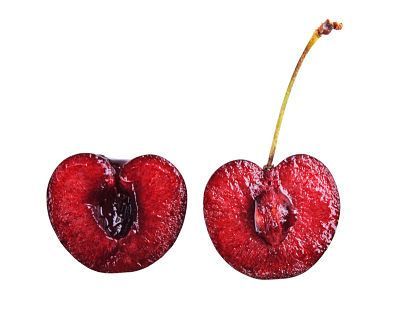Cherry Baby Food Recipes: Introducing and Serving This Fabulous Fruit to Your Baby
Updated: July 21, 2023
Here on our Cherry Baby Food Recipes page we have a range of totally delicious ideas for preparing these healthy fruits for your little one.
We’ll also help you determine WHEN to offer cherries to your baby and just WHY they’re so good for him!
Why cherries are so nutritious
Don’t you just love it when something tastes absolutely delicious and it just happens to be good for you too?
Cherries are a prime example of this – they’re sweet, luscious and juicy and simply brimming with important nutrients for your baby, including:
- Anthocyanins (the amazing antioxidants that give cherries their rich, red colour – visible proof of just how healthy they are!)
- Vitamin C
- Iron
- Calcium
- Potassium
- Fibre
- Beta carotene
- Melatonin (more about this below)
The health benefits of cherries
Cherries come in two main varieties – sweet (the kind that we tend to buy fresh and eat raw) and tart (the kind that’s usually used in pie fillings or sold dried).
A report commissioned by the Cherry Marketing Institute tells that cherries have been found to be as rich a source of antioxidants as blueberries – and whilst the dried, tart variety provide the most, fresh, sweet cherries are a wonderful source too!
Antioxidants provide a whole range of benefits to the body, including protection against cancer and a powerful boost to the immune system.
The melatonin in cherries, according to www.immunehealthscience.com, promotes brain health and also helps regulate our body’s internal clock.
This means it helps determine just when we wake up and when we fall asleep.
If a certain little someone’s body clock seems to be a tad off kilter, it certainly wouldn’t do any harm to see if a delicious bowl of two of healthy cherry puree would help things settle down!
Cherries are drupes, related to apricots, peaches and plums.
Like their relatives, cherries have something of a laxative effect on the body.
If your baby is constipated, try offering cherry puree, either alone or as part of a recipe (below) to help get things moving.
Conversely, be careful about giving your baby too many cherries at first, as they may trigger a bout of diarrhea.
More information about baby constipation
The nutrients in cherries may also help reduce inflammation AND help reduce cholesterol – important considerations in later life!
What a lot of wonderful reasons to introduce cherries to baby – and to enjoy them right along with him!

When can I introduce cherries to baby?
With your doctor’s consent, you can introduce cherries to your little one from 6 months of age.
Given their mildly laxative properties, however, you might want to delay their introduction until a little later in baby’s first year, particularly if he’s prone to upset tummies and diarrhea.
CHERRY ALLERGY
Whilst not a common allergy, it is possible for your baby to be allergic to cherries, and symptoms can sometimes be severe.
There are two types of cherry allergy.
One – the least severe and usually resulting in symptoms in and around the mouth (Oral Allergy Syndrome) is related to pollen allergy.
The allergen itself is destroyed by cooking, so people with this type of cherry allergy can usually eat cooked cherries without problems.
For that reason, it’s a good idea to initially offer your baby cooked cherries rather than raw.
The second type of allergy, which is related to peach allergy, can provoke more serious symptoms, including abdominal pain, urticaria (hives), Oral Allergy Syndrome and vomiting.
These reactions can sometimes be life threatening.
The allergen responsible can survive cooking, so people with this type of allergy can’t eat cherries at all.
Remember to speak to your doctor before introducing cherries – particularly if there is a family history of food allergy – and to observe to four day rule when you first include them in baby’s diet.
Choosing and storing cherries
The bad news? Fresh cherries are only available for a limited amount of time each year.
The good news? They freeze really well, so when they ARE in season it’s worth stocking up and filling that freezer!
The most popular varieties of sweet cherries are Bing and Lambert.
Bing cherries are almost black in colour, whereas Lambert are dark red.
As noted above, look for the darkest cherries for the variety you are buying, as they’ll contain the most anthocyanins.
The cherries you buy should be plump and shiny, not shrivelled and dull.
The place from which you buy them should have kept them cool – if they seem warm, it’s possible their taste and texture may have been adversely affected.
Look for cherries with their stems still attached and make sure the stems are nice and green – a great sign of freshness.
Keep your cherries in the fridge (don’t wash them before storing – instead, wash before serving).
They will last for up to a week, but check them often – just one bad cherry can quickly turn the whole bagful bad very quickly.
Handy tip…
Look for cherries that are dark in colour for their particular variety – it means that they contain more anthocyanins (antioxidants).
TO FREEZE CHERRIES
Pit them (more on this below), then spread them on a tray in a single layer and place them in the freezer.
Once frozen, transfer to a zip top bag.
You can keep frozen cherries for up to 12 months, although their nutritional quality does begin to decline over time.
That being said, the quality is still high compared to many other foods, or to cherries that have been imported or held in cold storage, which will also have suffered nutrient loss.
Preparing cherries for your baby
Cherries may be served cooked or raw (note our allergy information above), served as a finger food, pureed, or included as an ingredient in another recipe.
Cooking a cherry is as simple as pitting it, then simmering it in a little water until tender.
THE QUICK WAY TO PIT CHERRIES
Pitting cherries can be time consuming and laborious. Hands down the BEST tool for the job is the Cherry Chomper (from Amazon). It’s quick, easy and rather fun – our older kids are quite happy to pit cherries if they can use this tool!
If you want to serve uncooked cherries as a finger food, consider cutting them into quarters to reduce the choking hazard. Check the skins – if they’re really thick, your little one might have difficulty in managing them.
A good option in that case is to offer cherries in a Fresh Food Feeder (from Amazon) – they’re great frozen and served that way, too, especially if baby is teething.
Cherry baby food recipes
Cherry Puree
2 fl oz (1/4 cup) water
4 oz (1/2 cup) pitted cherries
- Pour the water into a small saucepan and add the cherries.
- Bring to a boil, then reduce the heat and simmer for around 3 mins, until softened.
- Puree in a blender.
If the cherries are a little tart, try simmering them in apple juice instead of water.
Cherry and Apple Puree
2 fl oz (1/4 cup) water
4 oz (1/2 cup) pitted cherries
1 small apple, cored and diced (no need to peel if baby is 6 months+ – more info here)
- Bring the water to a boil in the saucepan and add the apple dice. Lower the heat and simmer for 1 min.
- Add the cherries and simmer for a further 3 mins.
- Puree in a blender.
This recipe is also delicious using pear instead of apple.
Cherry and Banana Puree
cherry puree (made as described above)
1 small, ripe banana, peeled
- Puree or mash the ingredients together, adding as much cherry puree as you like to create the correct level of sweetness for your baby. This is a great way to serve cherries if they are a little tart!
Cherry and Banana Custard
2 egg yolks
8 fl oz (1 cup) milk – use whole milk, breast milk or formula
1/2 tsp vanilla extract
1/4 ripe banana
2 fl oz (1/4 cup) cherry puree
- Preheat the oven to 350 deg F (180 deg C).
- Puree the banana and cherry together and place into the bottom of a small oven proof dish or ramekin.
- Beat the egg yolks, vanilla and milk together. Pour into the dish.
- Place the dish into a small baking pan. Pour water into the pan (not the dish) until it comes around halfway up the side of the dish, creating a simple ‘bain marie’.
- Place in the oven and bake for 30 mins until the custard has set.
- Cool and serve chilled.
Cheery Cherry Cheesecake
2 tbsp cream cheese
1 tbsp cherry puree
1 tbsp natural yogurt
1/4 tsp vanilla extract (optional)
1 tsp wheat germ
- Thoroughly combine the first four ingredients.
- Sprinkle with wheat germ and serve.
Cherry and Banana Ice Cream
1 ripe banana
2 fl oz (1/4 cup) cherry puree
- Freeze the banana in its skin.
- Remove from the freezer, peel, then place in a blender with the cherry puree and process until smooth.
- Serve immediately. Delicious!
Cherry and Apple Ricotta Swirl
1 tbsp cherry and apple puree (using the recipe above)
2 tbsp ricotta
1/4 tsp cinnamon
- Stir the cinnamon into the cherry/apple mixture.
- Swirl the fruit puree into the ricotta.
- Sprinkle with a little ground flax for added nutrition (if desired).
Baby’s Cherry Breakfast Parfait
1 tbsp prepared oatmeal (cooled)
1 tbsp natural yogurt
1 tbsp cherry puree
1 tbsp mashed banana
1 tsp wheat germ
- Put the ingredients into baby’s serving dish, one layer at a time, in the order listed, ending with a topping of wheat germ.
- Serve chilled or warm.
Banana, Oat and Cherry Bars
This recipe uses dried cherries which are very nutritious, but rather tart. However, the banana in the recipe is sweet, providing a nice balance.
1/2 ripe banana
3 to 4 tbsp rolled oats
1 tbsp dried cherries (chopped)
- Preheat the oven to 350 deg F (180 deg C).
- Either grind the oats (for a smoother texture) or leave as they are.
- Mash the banana, then stir in the oats and dried cherries.
- Shape into ‘bars’ with your hands and place on a lightly greased baking sheet.
- Place in the oven and bake for 10 to 15 mins until pale gold in colour and firm to the touch.
- Cool and serve. You may freeze the leftovers for up to one month.
Cherry and Flax Muffins
This recipe makes 12 sugar free muffins.
2 large, ripe bananas, mashed
1 beaten egg
3 fl oz (3/8 cup) whole milk
4 fl oz (1/2 cup) water
4 oz (1 cup) all purpose (plain) flour
4 oz (1 cup) whole wheat flour
2 tsp ground flax
2 tsp baking powder
1 tsp baking soda
4 oz (1/2 cup) chopped fresh cherries
- Preheat the oven to 350 deg F (180 deg C).
- Combine all the ‘wet’ ingredients in one bowl and all the dry in another.
- Thoroughly mix the wet ingredients with the dry, then spoon the mixture into a greased 12 hole muffin tin.
- Bake for around 15 mins, until firm, risen and golden.
- Serve warm, or cool and store in an airtight container.
Cherry and Tofu French Toast
3 oz (1/3 cup) silken tofu
1 tbsp cherry puree
2 fl oz (1/4 cup) milk
1/4 tsp vanilla extract
pinch of cinnamon
whole wheat bread
- Using a food processor, mix the tofu, cherry puree, milk, vanilla and cinnamon.
- Cut the bread into squares and dip into the mixture.
- Heat a little oil or unsalted butter in a small frying pan and cook the bread for a few minutes on each side until golden.
Sweet Potato and Cherry Puree
It may sound unusual, but this is a very tasty (and nutritious!) combo.
1 small sweet potato
2 oz (1/4 cup) cherry puree
- Either peel the sweet potato, dice and simmer/steam for a few minutes until tender, or bake the whole potato in the oven for 40 to 60 mins, then peel.
- Mash the sweet potato with the cherry puree and serve.
Cherry Sauce for Meat
This simple recipe makes a wonderful sauce for any meat. If your baby doesn’t like the texture of meat, serving it in a sauce can really help!
4 oz (1/2 cup) fresh pitted cherries
2 fl oz (1/4 cup) low sodium or homemade chicken broth
1/4 tsp ground ginger
- Pour the chicken broth into a saucepan and add the cherries.
- Bring to the boil, then reduce the heat to a simmer. Cook for 3 mins.
- Transfer to a blender, add the ginger and puree until smooth.
- Serve warm over chopped meat, or puree the meat with the sauce.
Cherry and Chicken Salad
A fun, fruity finger food for older babies (can also be served from a spoon!).
4 oz (1/2 cup) cooked chicken, diced
2 oz (1/4 cup) fresh cherries, quartered
2 oz (1/4 cup) cooked white potato, diced
1 small avocado, pitted and peeled
1 tbsp natural yogurt
- Place the chicken, cherries and potato into a bowl and stir together.
- Puree the avocado with the natural yogurt.
- Stir the avocado ‘sauce’ into the ingredients in the bowl, until everything is coated. Serve immediately.


